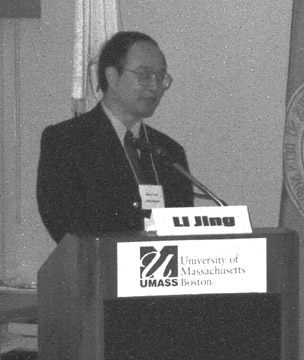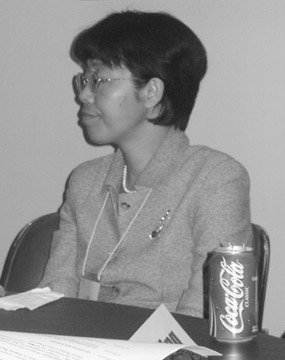Visitors from China Link up with UMass

Allan Guo, Coordinator of the China Program, moderates panel on investment in Shandong Province.
October 2, 2003
By Carl Brooks
Last Friday, a group of heavy hitters arrived on the UMass Boston campus from far-off Shandong Province, China. Headed up by the Deputy Secretary General of Shandong Province, Li Jing, the group toured some of the UMB facilities before presenting a speech on the current investment climate in Shandong.
The delegation from China had a quick tour of the campus and watched a brief presentation on UMassOnline. Hopes are high that this meeting could lead to a partnership in distance learning with some of the universities in Shandong. The university already has ties with the Oceans University and Qingtao Normal University in Shandong. Last week’s visit was arranged by the head of the China Program at UMB Allan Guo and hosted by Chris Cassidy, director of Corporate Outreach.
“Alan set it up,” says Cassidy. “He knows a lot of people.”
“We had heard they were in the country and we invited them. They weren’t recruited or anything, but they of course are interested in showing us what they have to offer.”
Cassidy explained the decision to host the delegation, ” We expect to develop future education and training programs for Shandong governmental employees and with the Oceans University,”
The group of high muckymucks from China saw a short presentation in the Healey Library before being hustled off to lunch. Kathy Galaitis of UMassOnline demonstrated the system’s capabilities, showing how students could watch streaming video of their professors, have interactive voice chats and download course materials. The delegation watched with apparent interest as Galaitis downloaded and played a recording of an ancient Chinese bone flute. She explained how the enrollment and coursework was performed and sounded a hopeful note on future collaborations with Chinese universities
“We hope we can work together with this- there will be exciting breakthroughs.”
The delegation met with a warm welcome and a hot tortellini lunch in the Quinn Building, which was attended by an interested crowd of local businesspeople and UMass faculty and staff, including Professor Lin Zhan, who visited China two years ago to work with Beijing University on medical research. Professor Zhan,who now teaches at UMass Lowell, was optimistic before the conference began, ” I think [the Chinese] are becoming so much more open and its good to see this. We have such a strong China program here, too.”
The Deputy Secretary General’s speech, “Market, Investment Environment and New Business Opportunities” was a fairly straightforward pitch for why foreign companies should invest in Shandong, and emphasized that the provincial government was rapidly moving away from the “state-owned enterprises” that had characterized China’s economy as a communist state, and into “a modern corporate system and modern business systems” that would have much more flexibility and look a great deal more like American and European business cultures.
Li Jing also bore down on the ever-growing foreign investment in Shandong, noting that U.S. investment was the third highest in the region, after Hong Kong and North Korea, with almost 4000 investment projects and $27 billion dollars tied up in the rapidly liberalizing province.
Speaking in forceful, heavily accented English, Li Jing also addressed issues of concern like workers rights, stating that fair labor conditions were being encouraged “to gain confidence with trade partners,” some of whom are leery of widely publicized tales of sweatshops and dangerous conditions.
After the Deputy Secretary General’s speech, a three-member panel was moderated by Allan Guo, who undertook to translate for the panel members. He joked, “Aside from their excellent English, [the panelists] also speak excellent Chinese.” They detailed at length the development of infrastructure and the pace of new industries in Shandong, and laid out the necessary steps to become an investor in their business community. Many attendees had specific questions for the panelists.
Thelma Cromwell-Moss, CEO of AAG industries, which manufacturers hazardous waste cleanup agents, wanted to know what the best strategy for success with her products would be. Chinese industry has a reputation for being heavy polluters. Sticking with the market-based approach, Li Huanting, Vice President of Trade and Promotion Commission for Qingtao City, said that Cromwell-Moss would need to “demonstrate the commercial ability [of her products] to interest trade or manufacturing partners,” and make sure that she had filed the appropriate patent protections with the Chinese government.
An investment counselor from Boston asked the panel how he could contact the right people to get his money moving, to which Guo quipped, “You should have checked with me!”
While reaction among the UMass educators was generally positive, they preferred to keep their emphasis on new ways of sharing academic cooperation, and some members of the business community were clearly there for the schmoozing. UMass alumnus and President of Safety.com Leonard Nuth, ’83, was frank, “Business in China is a great way to go. Really, I’m here to pick up [contracts] for the Olympics. That’s the biggie.” The 2008 Olympic summer games will be held in Beijing.























































